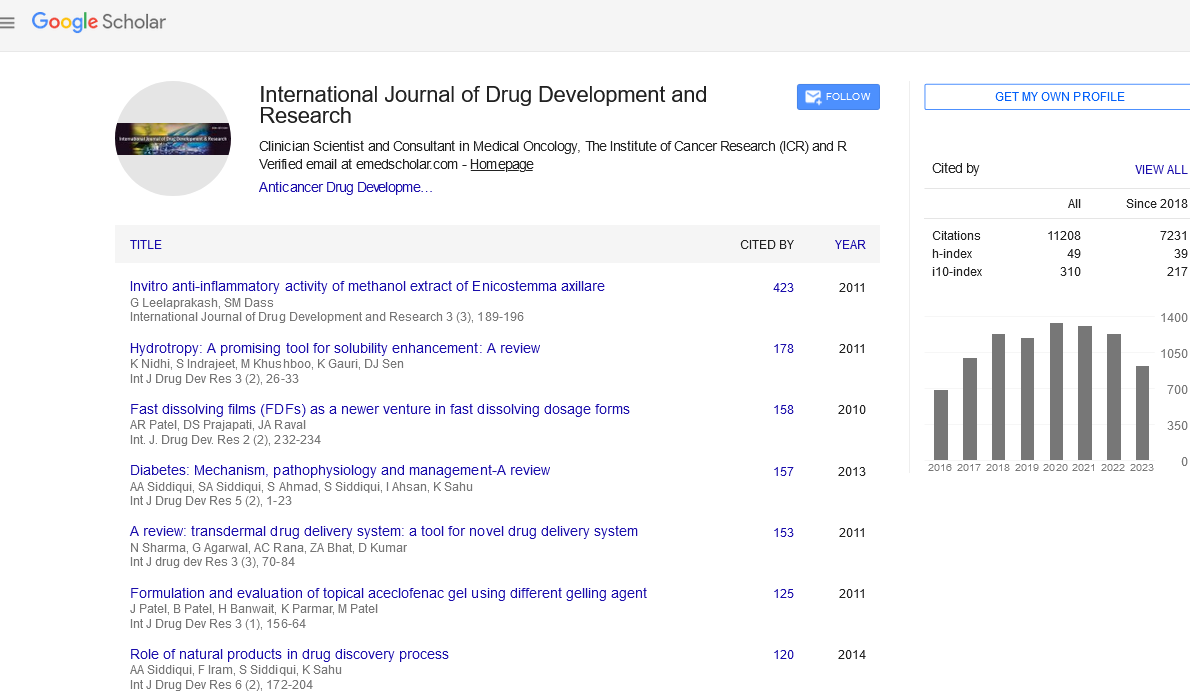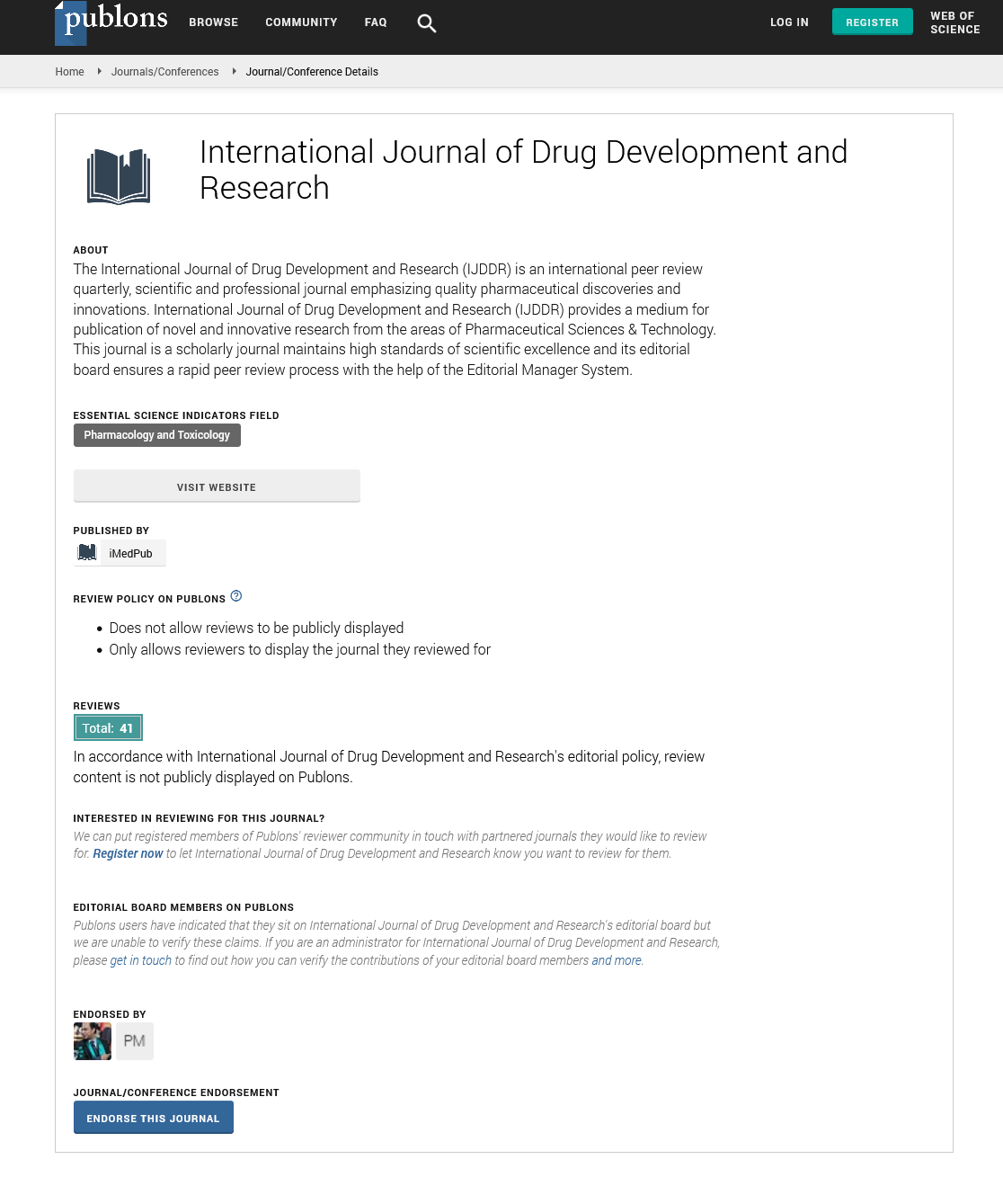Opinion - (2024) Volume 16, Issue 1
Navigating the Uncharted Waters: The Ongoing Impact of COVID-19 in the Current Landscape
Jenny Grigsasy*
Department of Pharmacy Practice, University of Brasilia, Brasilia, Brazil
*Correspondence:
Jenny Grigsasy, Department of Pharmacy Practice, University of Brasilia, Brasilia,
Brazil,
Email:
Received: 05-Jan-2024, Manuscript No. ijddr-24-14492;
Editor assigned: 09-Jan-2024, Pre QC No. ijddr-24-14492 (PQ);
Reviewed: 23-Jan-2024, QC No. ijddr-24-14492;
Revised: 02-Feb-2024, Manuscript No. ijddr-24-14492 (R);
Published:
12-Feb-2024
Introduction
As we stand at the intersection of hope and uncertainty, the
global community continues to grapple with the profound and
lasting impacts of the COVID-19 pandemic. Emerging in late
2019, the virus swiftly evolved into a formidable force,
challenging every aspect of our lives. While significant progress
has been made in terms of vaccination and treatment, the
current landscape remains marked by an intricate web of
challenges that extend far beyond the realms of public health. In
this article, we will delve into the multifaceted repercussions of
COVID-19, exploring its profound effects on various facets of
society, economy, and human behavior.
Description
The evolution of the virus
Since its initial emergence, the virus has undergone various
mutations, giving rise to new variants that have presented
additional challenges for containment and mitigation efforts.
The Delta variant, for instance, demonstrated heightened
transmissibility, leading to renewed concerns and adjustments in
public health strategies. The constant evolution of the virus
underscores the need for ongoing vigilance and adaptability in
our approach to managing the pandemic.
The global health crisis
The impact of COVID-19 on public health has been
unprecedented. Overwhelmed healthcare systems, strained
medical resources, and the tragic loss of lives have left an
indelible mark on communities worldwide. The mental health
toll, too, has been significant, with anxiety, depression, and
other psychological challenges affecting individuals of all ages.
As we move forward, addressing the mental health fallout and
fortifying healthcare infrastructure remain critical components
of the recovery process.
Economic disruptions
The pandemic triggered a seismic shock to the global
economy, with widespread disruptions across industries.
Lockdowns, travel restrictions, and supply chain interruptions
led to job losses, business closures, and economic contractions.
As economies navigate the path to recovery, fostering resilience,
innovation, and adaptability will be crucial for sustained growth.
The pandemic has also accelerated digital transformation,
prompting businesses to rethink their strategies and embrace
technology as a cornerstone for future success.
Remote work revolution
One of the enduring legacies of the pandemic has been the
widespread adoption of remote work. The traditional office
setup underwent a paradigm shift, with companies adapting to
decentralized work environments. This transformation not only
changed the way we work but also prompted a re-evaluation of
work-life balance, office culture, and the role of physical office
spaces. As organizations continue to navigate this new frontier,
hybrid work models are likely to become the norm, reshaping
the future of work.
Educational challenges and innovations
The education sector faced unprecedented challenges with
the closure of schools and universities. The shift to online
learning highlighted disparities in access to technology and
exacerbated existing educational inequalities. However, it also
spurred innovation, with educators and institutions embracing
new technologies and pedagogical approaches. The
hybridization of education, combining in-person and online
elements, is likely to persist, offering both challenges and
opportunities for the future.
Technological acceleration
The pandemic acted as a catalyst for accelerated technological
advancements. From the development of vaccines at an
unprecedented pace to the integration of artificial intelligence in
public health strategies, technology played a pivotal role in our
response to the crisis. As we move forward, harnessing the
power of technology for healthcare, communication, and
problem solving will continue to be instrumental in building
resilience against future challenges.
Social dynamics and connectivity
Social interactions underwent a fundamental shift during the
pandemic, with physical distancing measures reshaping the way
we connect. Virtual communication tools became lifelines for
maintaining relationships, conducting business, and staying
informed. As we emerge from the pandemic, a re-evaluation of
the importance of human connection and the role of technology
in fostering meaningful interactions will shape the social
landscape.
Environmental reflections
The pandemic prompted a temporary reduction in human
activities, leading to a visible impact on the environment.
Reduced travel, industrial activities, and emissions offered a
glimpse into the potential for positive environmental change. As
societies rebuild, there is an opportunity to integrate sustainable
practices and prioritize environmental conservation in the
pursuit of a more resilient and balanced future.
Conclusion
The ongoing impact of COVID-19 is a complex tapestry woven
with threads of challenges and opportunities. As we navigate the
uncharted waters of the post-pandemic era, it is crucial to draw
on the lessons learned, foster resilience, and cultivate a spirit of
innovation. From healthcare and the economy to work,
education, and social dynamics, the repercussions of the
pandemic extend into every facet of our lives. By embracing
adaptability, leveraging technology, and prioritizing global
collaboration, we can not only overcome the immediate
challenges but also build a more resilient and sustainable future
for generations to come.
Citation: Grigsasy J (2024) Navigating the Uncharted Waters: The Ongoing Impact of COVID-19 in the Current Landscape. Int J Drug Dev Res Vol:16 No:1






